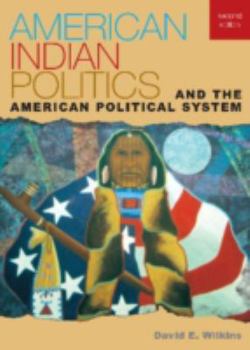American Indian Politics and the American Political System
Select Format
Select Condition 
Book Overview
American Indian Politics and the American Political System provides a comprehensive introduction to the history, structure, and function of tribal governments and their relationship to contemporary American politics. The second edition incorporates fresh census data, thorough discussion of the critical electoral changes in the 2000 and 2004 national elections, and data on President Bush's first and second terms. This edition also explores the effects of changes in U.S. Senate and House personnel and state legislation on Indian rights and the state-tribal relationship.
Format:Paperback
Language:English
ISBN:0742553469
ISBN13:9780742553460
Release Date:June 2006
Publisher:Rowman & Littlefield Publishers
Length:375 Pages
Weight:1.95 lbs.
Dimensions:1.0" x 7.0" x 9.9"
Customer Reviews
3 ratings
excellent, authoritative resource
Published by Thriftbooks.com User , 15 years ago
One of the few studies of Native American politics out there today. I teach courses in racial and ethnic politics, and this book is incredibly helpful, not only for the arguments that Wilkins makes, but perhaps even more so because of its comprehensive scope--both historically, and with respect to political behavior *and* institutions.
American Indian Politics .. what a history lesson!
Published by Thriftbooks.com User , 15 years ago
As a descendant of the Lumbee Indians of North Carolina, David Wilkins is the perfect person to write this very informative book. If you are interested in the history of the native American peoples, I recommend that this book is in your reading list.
best textbook treatment of American Indians in US political system
Published by Thriftbooks.com User , 19 years ago
This is an essential text on role of Indians in US political system, designed to be used by undergraduates. The chapters cover just about every issue, including history, demographics, activism, tribal political systems, federal and state policies toward Indians, and the images of Native Americans in national media. The emphasis is on Native Americans within the US political system as a whole, and not on politics within tribes or on reservations. Though the factual material is presented in a balanced way, Wilkins has a clear political position that is evident in every chapter of the text. Among other consequences, this means that he does not take a critical stance toward the tribal governments, political movements, or individual Native Americans that he discusses. In the classroom, this would provide a good foundation for discussion, while the non-classroom reader will simply have to read the book critically. While the bias is a "feature," not a "flaw," the book also has some minor flaws. For examples, uncertain organization mars the chapter on "actors in Indian politics." Rather than focusing narrowly on these actors, Wilkins intersperses his treatment of actors and the history of particular policies. Some of this confusion is inevitable, since the role of the BIA as an actor obviously reflects the legislative history of the agency, but Wilkins does not try to keep these issues analytically distinct. Oddly for a book on politics, Wilkins doesn't discuss tribal political systems all that much. For much better treatment of this issue, albeit one limited to the Montana reservations, see Lopach et al., Tribal Government Today. Despite these weaknesses, this really is the best overall book on American Indian politics that I have been able to find. It would be useful both for the general reader interested in the topic and for undergraduate classroom use.






